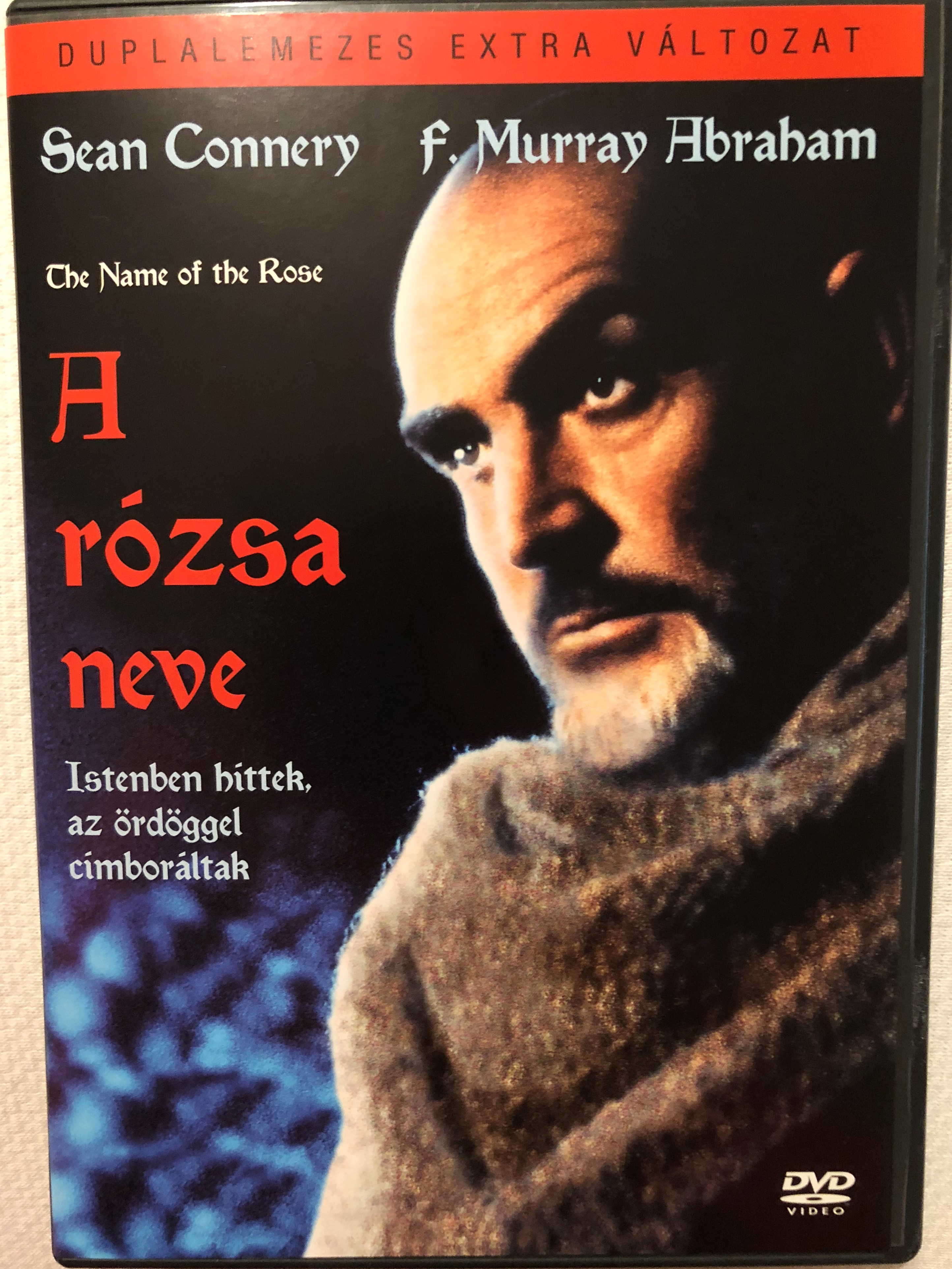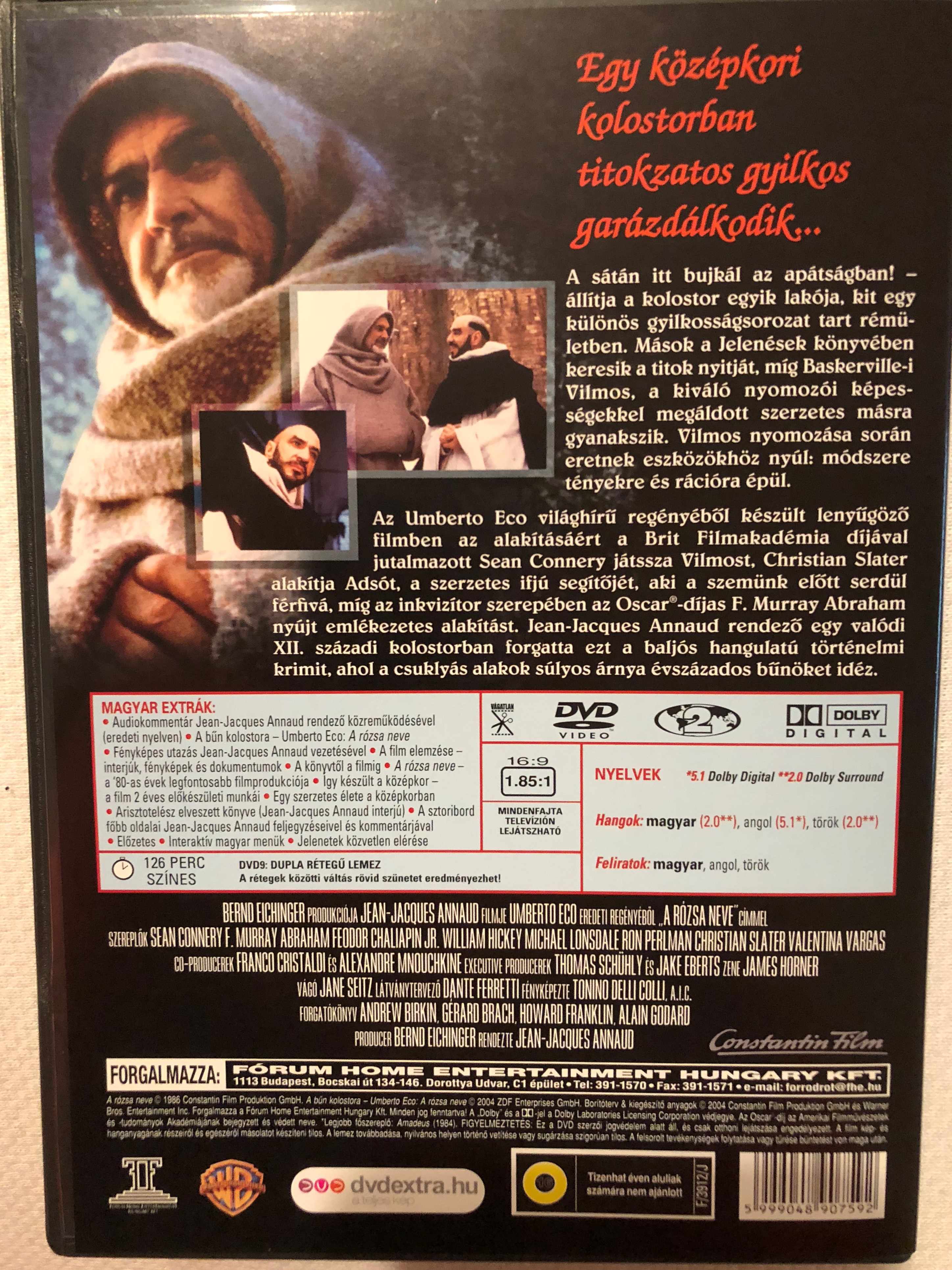Description
The Name of the Rose DVD 1986 A rózsa neve
Mystery historical drama film 2 DVD Collector's Extra Version
Directed by Jean-Jacques Annaud
Based on 1980 debut novel by Italian author Umberto Eco / The novel has sold over 50 million copies worldwide
Starring: Sean Connery, Christian Slater, Helmut Qualtinger, Elya Baskin, Michael Lonsdale
UPC 5999048907592
REGION 2 PAL DVD
Language options: English, Hungarian, Turkish
Subtitle options: English, Hungarian, Turkish
Playtime 126 Minutes + Full disc of Extra features
DVD CONDITION: Used - Very Good!
The Name of the Rose is a 1986 Italian-French-German mystery historical drama film directed by Jean-Jacques Annaud, based on the book of the same name by Umberto Eco. Sean Connery stars as the Franciscan friar William of Baskerville and Christian Slater is his apprentice Adso of Melk; they are called upon to solve a deadly mystery in a medieval abbey.
Cast
- Sean Connery as William of Baskerville
- F. Murray Abraham as Bernardo Gui
- Christian Slater as Adso of Melk, the youngest son of the Baron of Melk
- Helmut Qualtinger as Remigio de Varagine
- Elya Baskin as Severinus
- Michael Lonsdale as The Abbot
- Volker Prechtel as Malachia
- Feodor Chaliapin, Jr. as (Venerable) Jorge de Burgos
- William Hickey as Ubertino de Casale
- Michael Habeck as Berengar
- Urs Althaus as Venantius
- Valentina Vargas as The Girl
- Ron Perlman as Salvatore
- Leopoldo Trieste as Michele da Cesena
- Franco Valobra as Jerome of Kaffa
- Vernon Dobtcheff as Hugh of Newcastle
- Donal O'Brian as Pietro d'Assisi
- Andrew Birkin as Cuthbert of Winchester
- Lucien Bodard as Cardinal Bertrand
- Peter Berling as Jean d'Anneaux
- Pete Lancaster as Bishop of Alborea
- Dwight Weist as the Voice of Adso as an old Man (voice)


Plot:
As an old man, Adso of Melk recounts how, in 1327, as a young Franciscan novice (a Bendecitine one in the novel), he and his mentor, Franciscan friar William of Baskerville, traveled to a Benedictine abbey in northern Italy where the Franciscans were to debate with Papal emissaries the poverty of Christ. The abbey boasts a famed scriptorium where scribes copy, translate or illuminate. books. The monk Adelmo of Otranto —a young but famous manuscript illuminator— was suspiciously found dead, below a tower with only a window which cannot be opened. The abbot seeks help from William, who is renowned for his deductive powers. William is reluctantly drawn in by the intellectual challenge and his desire to disprove fears of a demonic culprit. William also worries the abbot will summon officials of the Inquisition if the mystery remains unsolved.
William later finds Venantius, a translator of Greek and the last to speak with Adelmo, dead in a vat of pig blood. The corpse bears a black stain on a finger and the tongue. The monks suspect a supernatural cause, fears reinforced when the saintly Fransciscan friar Ubertino of Casale warns that the deaths resemble signs mentioned in the Book of Revelation. In the scriptorium, William inspects Adelmo's desk, but is blocked by Brother Berengar, the assistant librarian, and Brother Malachia, the head librarian, denies William access to the rest of the building.
William encounters Salvatore, a demented hunchback, and his protector, Remigio da Varagine, the cellarer. William deduces that both were Dulcinites, members of a heretical sect that believes that clergy should be impoverished. William does not suspect them of murder though, since Dulcinites target wealthy bishops, not poor monks. Nevertheless, Remigio's past gives William leverage in learning the abbey's secrets. Salvatore tells William that Adelmo had crossed paths with Venantius on the night that Adelmo died. Meanwhile, Adso encounters a beautiful semi-feral peasant girl who has sneaked into the abbey to trade sexual favours for food, and is seduced by her.
Returning that night to Venantius's desk, William finds a book in Greek, and also a parchment with Greek writing, smudges of a color blended by Adelmo for illuminating books, and cryptic symbols written by a left-handed man using invisible ink. Berengar sneaks into the darkened library, distracts William and steals the book.
Berengar is later found drowned in a bath and bearing stains similar to those on Venantius. William narrates his conclusions that Adelmo's death was indeed suicide, due to giving in to Berengar's requests for homosexual favors, but he fell from a different tower. Venantius received a parchment from Adelmo before Adelmo's death, and Berengar is the only left-handed man in the abbey. William theorizes that the translator transcribed the Greek notes on the parchment from a book, and that the book is somehow responsible for the deaths. The abbot is unconvinced and, burning the parchment, he informs William that the Inquisition — in the person of Bernardo Gui, an old adversary of William — has already been summoned.
Determined to solve the mystery before Gui arrives, William and Adso discover a vast, hidden library above the scriptorium. William suspects the abbey hid the books because much of their contents comes from pagan philosophers. Gui finds Salvatore and the peasant girl fighting over a black cockerel while in the presence of a black cat. For Gui, this is irrefutable proof of witchcraft, and he tortures Salvatore into a false confession. The abbey's herbalist finds a book written in Greek in his dispensary, and is overheard telling this to William. Soon, the herbalist is found murdered in the now ransacked dispensary.
Learning of Remigio's Dulcinite past, Gui arrests him for the murders. Along with Salvatore and the girl, Remigio is brought before a tribunal, with Gui, the abbot and William as judges. Remigio proudly admits his past but denies having killed anyone in the abbey. While the abbot quickly condemns Remigio for murder, William points out that the murders are tied to the Greek book, which Remigio could not read, and warns that Remigio's execution will not end the murders. Under Gui's threats of torture, however, Remigio "confesses" by falsely summoning the Devil. Gui arranges for the prisoners to be burned at the stake, while William, having "relapsed", will be taken to Avignon.
Soon afterwards Malachia is found dying, with black stains on his tongue and finger. As the monks prepare Gui's prisoners for execution, William and Adso re-enter the secret library and come face to face with the Venerable Jorge, the oldest denizen of the abbey. Having decoded the lines on the translator's parchment, William demands that Jorge turn over the book that the dead men had been reading: Aristotle's Second Book of Poetics on Comedy. Believing laughter to be sinful, Jorge killed those who had read the book by poisoning its pages, but William does not fall for this trap when Jorge "rewards" him with the book. Confronted, Jorge accidentally starts a blaze that quickly engulfs the library. William stays behind, trying to save some of the books and encouraging Adso to leave. Jorge kills himself by consuming the poison-coated pages.
Seeing the fire, the monks abandon the prisoners, allowing the local peasants to save the girl, though Salvatore and Remigio die. Adso chases Gui, who manages to escape him, but the peasants push his wagon off a cliff, impaling him. As William and Adso depart, Adso encounters the girl, stops for a few seconds, but eventually chooses to go with William. The much older Adso states that he never regretted his decision, as he learned many more things from William before their ways parted. He also says that the girl was the only earthly love of his life, although he never learned her name.
| Directed by | Jean-Jacques Annaud |
|---|---|
| Produced by |
|
| Screenplay by | |
| Based on | The Name of the Rose by Umberto Eco |
| Starring | |
| Narrated by | Dwight Weist |
| Music by | James Horner |
| Cinematography | Tonino Delli Colli |
| Edited by | Jane Seitz |
|
Production
company |
|
| Distributed by | 20th Century Fox (USA & Canada) Columbia Pictures (International) |
|
Release date
|
|
|
Running time
|
126 minutes |
| Country |
|
| Language | English |
HUNGARIAN DETAILS:
A rózsa neve DVD
Umberto Eco azonos című, igen szövevényes regényének átdolgozása éppoly izgalmas, mint szórakoztató. A történetet a szemtanú, a kolostort meglátogató Adson visszaemlékezése tárja a néző elé.1379-ben Baskerville-i Vilmos ferences szerzetes és fiatal kísérője, Adson von Melk felkeresnek egy észak-itáliai bencés kolostort az Appeninek magányos völgyeiben. Útjuk egyházi feladat, egy teológiai vitát kell előkészíteniük. Pápai legátusok és ferences szerzetesek között kell a világi hatalmi törekvések, a földi javak gyűjtése és a krisztusi szegénységi fogadalom figyelembevételével az egyház szerepének kérdését tisztázni. Mielőtt azonban az előkészületeket megkezdhetnék, néhány titokzatos haláleset bolygatja föl a kolostor nyugodt életét. William nyomozni kezd, és a két látogató hamarosan felfedezi, hogy a közösségben az ájtatosság máza mögött titokzatos és gonosz dolgok történnek és a szerzetesek nem természetes halállal haltak meg...A film 1987-ben a legjobb külföldi filmnek járó César-díjat kapta.
F/3912/J - 16 éven aluliak számára nem ajánlott.
- Hossz: 126 perc
- Hangsávok: magyar - Surround, angol - Dolby Digital 5.1, török - Surround
- Feliratok: magyar, angol, török
Extrák:
Előzetes , Képgaléria: Fényképes utazás a rendező vezetésével , Werkfilm: A bűn kolostora - Umberto Eco: A rózsa neve , audiokommentár a rendező közreműködésével





















